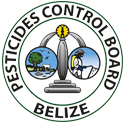
HISTORY
THE REGULATION OF PESTICIDES IN BELIZE
20 YEARS, 20 DEFINING MOMENTS
1988 TO 2008
The Pesticides Control Board of Belize is a statutory Board under the Ministry of Agriculture, mandated with the implementation of the provisions of the Pesticides Control Act. The Pesticides Control Act was passed in the National Assembly in 1985 to provide for the control of the manufacture, importation, sale, storage and use of pesticides, and related matters. The Act came into effect on 31st December 1988.
The fourteen-member Board is appointed by the Minister responsible for agriculture, for a term of two years. Statutory appointments from the public and private sectors include members from the Ministry of Agriculture, Ministry of Health, Department of the Environment, the Belize Agricultural Health Authority and four agriculture producer associations. As required by the Pesticides Control Act, the remaining six members are appointed by the Minister in his discretion from among persons with knowledge of agriculture or the field of pesticides.
The Pesticides Control Board Secretariat (and the Inspectorate) was established in May 1988 in anticipation of the passing of the Act and has been operating since that time in Central Farm in the Cayo District. The Secretariat is responsible for the enforcement of pesticides laws and regulations and the provision of services to the general public in the area of pesticide management.
The achievements of the Pesticides Control Board over the last twenty-five+ years, while limited in view of all that still remains to be addressed, have laid an important foundation for the regulation of pesticides in Belize. The work of pioneering Board members, as well as those who also took on the mantle to deliver for Belize the comprehensive regulation of pesticides for the protection of human health and the environment, is well recognized.
Some of the most significant defining moments in the history of the Pesticides Control Board and pesticide regulation in Belize are shared below:
-
−
1985
Largely propelled by a threat to Belize’s beef and citrus exports brought on by the detection of organochlorine insecticides in these commodities, a small team of senior scientists from within the Ministry of Agriculture make a start to develop a regulatory scheme for pesticides in Belize. These Pesticides Control Board pioneers included Dr. Marla Holder, Dr. Erasmo Franklin and Mr. Jose Novelo.In what is still seen as an emergency reaction to an export threat, the Pesticides Control Act (PCA) is drafted, based on a Trinidad & Tobago model, and passed in the National Assembly in December 1985. The social and environmental aspects of pesticide regulation would come to the fore later on.
-
−
1986
Dr. Robert Black joins the Ministry of Agriculture of Belize as Plant Pathologist and Head of the Plant Protection Service. Dr. Black’s commitment and energy assists the original team immensely in the drive to bring the PCA into force. His 1986 presentation of the paper “Implications of the Pesticides Control Act for Agriculture in Belize”, delivered at the 7th National Agricultural Research and Development Symposium, helped to move the implementation of the PCA to the Ministry’s front burner.
-
−
1987
The Pesticides Control Board, comprised of 14 members, is appointed by the Honorable Minister of Agriculture, Dean Lindo. Dr. Erasmo Franklin is appointed to serve as Chairman of the Board; a position he holds until 1991. Dr. Black is appointed Secretary to the Board, and serves in this capacity up until the end of his contract term in 1989, when he returns to the U.K.
One of the first tasks facing the newly appointed Board, officially meeting for the first time in October 1987, was the review of the Schedules of Pesticides, which had been passed along with the Act in 1985. These Schedules classified pesticides in three categories: registered (now referred to as general-use), restricted and prohibited. The Board’s early decision for the ban of nearly all organochlorine insecticides, as well as other extremely toxic pesticides, had given rise to opposition by some user groups but held up to scrutiny by legislators.
This decision will later place Belize in the international limelight as one of the few developing nations to ban certain pesticides as these become the focus of initiatives for global phase-outs, such as is the case with methyl-bromide.
-
−
1988
The Government of Belize grants an annual subvention of $57,400 to the Pesticides Control Board, thereby paving the way for the implementation of the PCA. This funding now makes possible the hiring of staff – an Administrative Assistant and two Technical Assistants.
The Pesticides Control Act, which been passed in the National Assembly in 1985, is amended to allow for the phased implementation of the provisions dealing with the certification of users of restricted pesticides. The amendment to the Act also permits a grace period during which existing stocks of prohibited pesticides could be used. The PCA comes into effect by way of Commencement Order (S.I. No. 95 of 1988) on 31 December 1988.
-
−
1989
The licensing of importers and distributors of pesticides commences in Belize, made possible through Regulation No. 8 of 1989. In preparation for this, the Board’s Secretariat had been involved in an intensive public relations program to sensitize importers and distributors of the new requirements. Prior to this time, the storage and distribution of agrochemicals from general grocery stores was commonplace.
The Board reviews a proposal for the establishment of a 2,4-D plant in Belize, and makes recommendations to the Ministry of Agriculture focusing on the country’s limited capacity to adequately monitor such a plant. This type of decision-making, based on precautionary principles coupled with scientific assessment, becomes one of the hallmarks of the Board. In retrospect, it is clear that the strength and prudence on the part of these early decision-makers has spared Belize from many adverse pesticide impacts otherwise common in developing nations.
A workshop is held in October 1989, with assistance from the FAO, to discuss and assess Belize’s implementation of the FAO Code of Conduct on the Distribution and Use of Pesticides. The workshop report commended the steps that Belize had taken in establishing a pesticide management scheme for the country, and further made notable mention of the phased approach that had been taken for the enforcement of the PCA. The report also made recommendations for addressing the gaps identified due to the lack of adequate resources.
-
−
1991
The Board appoints a Committee to review the tariff regulations on pesticides and to make recommendations for submission to the Minister of Agriculture for further submission to the Ministry of Finance. The Committee recommends exemption of import and stamp duties on pesticides. As a result of this initiative, import duties on all agricultural pesticides are removed; 12% stamp duty remained.
-
−
1992
U.S. AID Consultant Mario Contreras conducts review of the Pesticides Control Board and makes timely recommendations for the “strengthening of the Board’s performance in fulfilling its national mandate”. These recommendations included: streamlining of the Board’s operations; review of the pesticides registration procedures to allow for registration of formulations instead of active ingredients; and the refining of fees for licences and permits to allow for sustainability of the Board and its functions..
-
−
1993
Board Secretary Mario Fernandez drafts proposals for restructuring of fees charged for pesticide importation, and for the registration of pesticides by trade name and formulation. Once these proposals are accepted and signed by the Minister of Agriculture in the form of Regulations in 1995, the Board is able to overcome a serious financial crisis and moves toward greater self-sufficiency. This eventually widens the reach of the Board’s activities especially through an increase in field staff.
-
−
1994
Having been awarded a CAP II allocation for the construction of its own office building, the Pesticides Control Board Secretariat moves to the new headquarters building located in Central Farm in September 1994. The morale of the staff is boosted by this move, as all five members had been sharing one cramped office at the Plant Protection Service building.
A technical cooperation project between the U.K.’s Overseas Development Administration (ODA) and the Belize government to strengthen the Plant Protection Service of Belize facilitates the strengthening of pesticides legislation. The proposals address the pesticide registration system, fine-tuning of the distribution regulations and the certification of pesticide applicators.
-
−
1995
Statutory Instrument No. 77 of 1995 is approved and signed instituting the formal pesticide registration scheme. This system requires the registration of pesticides by trade name and formulation, as opposed to the former system of registration of active ingredients.
-
−
1996
The Regulation governing the pesticide import licensing system is amended, and a new fee scale is introduced which levies an import fee of 2% on pesticide imports.
The National Pesticides Certification Program (NPCP) officially commences by way of the Certified User Regulations S.I. No. 112 of 1996, which requires the certification of all users of restricted-use pesticides. Funding to the Board through a NARMAP project served as the launch pad for the extensive countrywide training and certification of pesticide applicators to commence.
This comes only eight years after the Board’s original Training Committee, comprised of members Dr. Marla Holder, Dr. Robert Black and Mr. Ralph Barrett, first drafted a proposal for a training programme. In these eight years, the Board’s Technical Assistants had been busy conducting countrywide training in preparation for the full-fledged program to train and certify users of restricted-use pesticides.
Belize joins the Organismo Internacional Regional de Sanidad Agropecuaria (OIRSA). This leads to Belize’s greater involvement in the region’s initiative for the harmonization of pesticides regulations, among other areas.
-
−
2002
The Pesticides Control Act is amended to allow for replacement of the position of Secretary with that of Registrar of the Board; allowing for the making of regulations to provide for Codes of Practice for handling pesticides; and for rationalizing the composition of the Pesticides Control Board membership.
-
−
2003
Subsequent to the work carried out by OIRSA’s Technical Working Group on Pesticides, in which Belize had become an active member since joining the organization in 1996, an amendment to the 1995 registration regulations is approved and signed. This updates Belize’s regulations in line with regionally harmonized guidelines for pesticide registration and labeling requirements.
